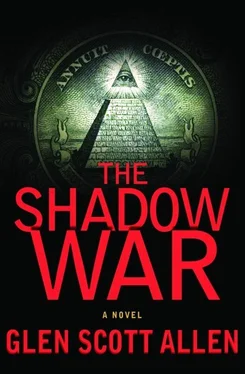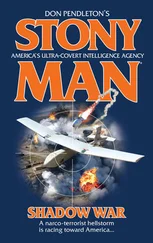Glen Allen - The shadow war
Здесь есть возможность читать онлайн «Glen Allen - The shadow war» весь текст электронной книги совершенно бесплатно (целиком полную версию без сокращений). В некоторых случаях можно слушать аудио, скачать через торрент в формате fb2 и присутствует краткое содержание. Жанр: Триллер, на английском языке. Описание произведения, (предисловие) а так же отзывы посетителей доступны на портале библиотеки ЛибКат.
- Название:The shadow war
- Автор:
- Жанр:
- Год:неизвестен
- ISBN:нет данных
- Рейтинг книги:5 / 5. Голосов: 1
-
Избранное:Добавить в избранное
- Отзывы:
-
Ваша оценка:
- 100
- 1
- 2
- 3
- 4
- 5
The shadow war: краткое содержание, описание и аннотация
Предлагаем к чтению аннотацию, описание, краткое содержание или предисловие (зависит от того, что написал сам автор книги «The shadow war»). Если вы не нашли необходимую информацию о книге — напишите в комментариях, мы постараемся отыскать её.
The shadow war — читать онлайн бесплатно полную книгу (весь текст) целиком
Ниже представлен текст книги, разбитый по страницам. Система сохранения места последней прочитанной страницы, позволяет с удобством читать онлайн бесплатно книгу «The shadow war», без необходимости каждый раз заново искать на чём Вы остановились. Поставьте закладку, и сможете в любой момент перейти на страницу, на которой закончили чтение.
Интервал:
Закладка:
Displayed there was the same graph he and Wolfe had seen that night in Fletcher's room: the two sides of a rising bell curve, with a missing middle.
"We saw this," Benjamin said. "Samuel called it a… a Nash equilibrium?"
"Yes, exactly. He says what that means?"
"Well, something about two sides playing a game, and if each knows what the other will do, they've reached a stalemate."
Anton nodded. "Right again. TEACUP tells Fletcher Cold War at stalemate. In sixties."
"Well, see, that's what I don't understand. Why is that big news? Of course it was a stalemate. That's why it was the Cold War, right?"
Anton smiled, looking a little smug. "According to TEACUP, such, how is it, standoff shouldn't happen for at least another five, ten years. Or should collapse, you know, go boom. Or even end. Guys who built first U.S. missiles, what you call Minutemen, made them to last only ten years. They figure, by then, madness over."
"But, aren't they still there?"
"Exactly so," nodded Anton. "Rusting in silos. See, in beginning, everybody know MAD is, well, crazy. And according to TEACUP, good chance there is something fake about this nice Nash equilibrium."
"How good a chance?" asked Benjamin.
"Eighty percent," replied Anton.
Benjamin remembered: the two incomplete graphs, and above them the blinking red number.
Eighty percent.
"That's… incredible." He ran a hand through his hair, felt the fatigue catching up with him again. He wished Samuel were there with them, patiently explaining, coaching Benjamin's thinking in the right direction… He even felt he wouldn't mind a good, stiff shot of scotch right now.
"I'm sorry," he said, "I'm still very tired. And even if you're right, there's still a lot I don't understand. Why would anyone kill Jeremy over this? For that matter, why would they kill Edith? And how does all this even connect with her work?"
"I show you." Anton leaned over to the computer, moved the cursor around and opened one of the files, then turned the screen so Benjamin could see what was displayed. Benjamin recognized it from the Gadenhower file.
"See this?" Anton pointed at the formulae. "All about how bees use enemies to make hive act this way, that way."
"Something Edith called 'swarm intelligence,' " said Benjamin.
"Exactly so," said Anton. "Bees a kind of… model. For how people act even when not sure why they do what they do. Beehive a kind of conspiracy without little workers knowing is conspiracy. Understand?"
Then Benjamin remembered something Edith had said in her lab. "What appears random is really a bunch of small acts, all of them overlapping, interacting, until finally what you get is-"
"Called 'emergent phenomenon.' Too complex to see right away. Looks like chaos, but really strategy. Fletcher talks to Edith, puts that into TEACUP… suddenly he calls you, has heart attack, and all hell breaks loose." Anton sat back, making the chair squeak loudly. "Was maybe key TEACUP needed."
Benjamin thought for a moment. "Edith's research is about how what looks like a conspiracy really isn't, yes?"
Anton smiled broadly. "And if you turn it around?" He waited for Benjamin to think that over.
"Then…" Benjamin looked up. "It would be a model for how what doesn't look like a conspiracy really is?"
"Again, smart kid," Anton said. "So smart kid, know plan for end of world?"
"Uh… no," Benjamin said.
"I show you."
Anton stood up, went to the blackboard and turned it over to the blank side.
He drew a big circle on the left side of the board and inside it he wrote one word in capital letters: SIOP.
"This is United States plan for nuclear war. SIOP. Single Integrated Operational Plan." He drew many lines out from the circle to little stick figures of planes, missiles, and submarines. "Tells everybody when to shoot, how much to shoot, where to shoot." He tapped the chalk on the blackboard. "Same SIOP since 1963. Forty years, still same. Wolfe and me, we tell them ten years ago, when we at Foundation together, time to change SIOP. But noooo, they say. Too expensive, too complicated."
He shook his head, laughed. "Not make sense. Soviet Union is gone. Half of Russian missiles, submarines, bombers? All gone. But still, this SIOP not change. Like doesn't matter Soviet missiles mostly gone." Anton wrinkled his nose. "Something fishy, yes?"
He moved to the other side of the blackboard, drew another circle. Inside this one he wrote strategija #1.
He tapped with the chalk. "This Strategy Number One. Stalin's strategy. Basically, is start war, if anything go wrong, blow up world. But then, thanks god, Stalin dies, Khrushchev comes. Little more sense than Stalin. So," he erased the #1 with the cuff of his sweater, wrote #2, "we get strategija #2. Put missiles in Cuba. Big SS-4s, even bigger SS-5s. Spook Kennedy. Great idea."
He turned and faced Benjamin. "Only not so great idea. Kennedy not spooked. Why?" Anton smiled at him, a bright twinkle in his eye.
"Kennedy tells everyone, big missile gap, Russians have thousand missiles. Ha!" Under the circle he wrote two numbers: 3,000 and 300. He tapped the 3,000. "This is how many bombs U.S. has." He tapped the 300. "This how many bombs USSR has." He looked at Benjamin. "As kids say, do the math."
"So," Benjamin said, "the whole missile gap scare-"
"Big hooey," said Anton. "Cuba episode spooks somebody, yes. Spooks Soviets. And," he held up a finger, "Soviets spook themselves. Khrushchev sends four submarines, new Foxtrots, to Cuba. Each has nuclear torpedo. U.S. Navy sits on them, like hen on egg. One Soviet captain gets nervous, damn near shoots big fish at U.S. Navy boat."
"How could he have the authority to do that?"
"Ah," said Anton. He pointed to the SIOP circle. "In U.S. plan, president controls everything, even submarines. But," he pointed to the strategija circle, "in Soviet plan, tell submarine captains, you decide whether blow up world or not. And good luck."
He turned and looked at Benjamin, frowning. "Big problem, yes? So," again he erased the number next to strategija, and now wrote in 55, "something change. After Cuba, new strategy. New launch codes, all controlled by Moscow."
Benjamin thought of two questions, asked the first. "But why fifty-five? Why not Strategy Number Three?"
Anton laughed. "Old Soviet joke. In Red Army after Revolution, every officer responsible for his own pistol. All pistols numbered. So, Cheka-Secret Police-line up officers. Ask first one, 'What number pistol?' Officer answers, '23.' Cheka man looks, number should be 32. So bang, shoots officer. Asks next one, 'What number pistol?' Officer says, '34.' Cheka man looks, number should be 43. Bang, shoots again. Asks third officer, 'And what number your pistol?' '55,' he says." Anton smiled. "Get it? Number can't be wrong."
"So," Benjamin said, "this strategy 55, it's a joke?"
"Not joke," said Anton. "But not real, either. Nobody sees it. It's a privedenie, a ghost."
"Okay, here's my second question," said Benjamin, "and maybe it's dumb, because I don't know Russian. But the name of the file on Fletcher's computer is Stzenariy 55, not Strategija 55. And Samuel said he thought stzenariy meant 'script,' not 'strategy.' "
Anton smiled very broadly. "Samuel right," he said. "Means 'script,' like for movie. Screenplay you call it?" Benjamin nodded. "Very dramatic word. Very… artistic word. And therefore very interesting word. Is KGB-type word."
"I don't see the-"
"KGB guys consider themselves not soldiers, not apparatchiks. Great spies. Great artistes. Tend to use such words."
"So that name indicates the plan originated with the KGB?"
Anton nodded, made his way to the armchair, sat down again, exhaled.
"Anyway, whether is strategija or stzenariy, nobody ever see this number 55. Only rumors, then nothing. Instead get Strategija Chetyre, number four. But strange, is not much strategy. Mostly propaganda and nonsense." Anton held up a finger. " And something else. Americans think 1963 and Cuba closest world comes to big bang, yes? Not so. Was 1968."
Читать дальшеИнтервал:
Закладка:
Похожие книги на «The shadow war»
Представляем Вашему вниманию похожие книги на «The shadow war» списком для выбора. Мы отобрали схожую по названию и смыслу литературу в надежде предоставить читателям больше вариантов отыскать новые, интересные, ещё непрочитанные произведения.
Обсуждение, отзывы о книге «The shadow war» и просто собственные мнения читателей. Оставьте ваши комментарии, напишите, что Вы думаете о произведении, его смысле или главных героях. Укажите что конкретно понравилось, а что нет, и почему Вы так считаете.












